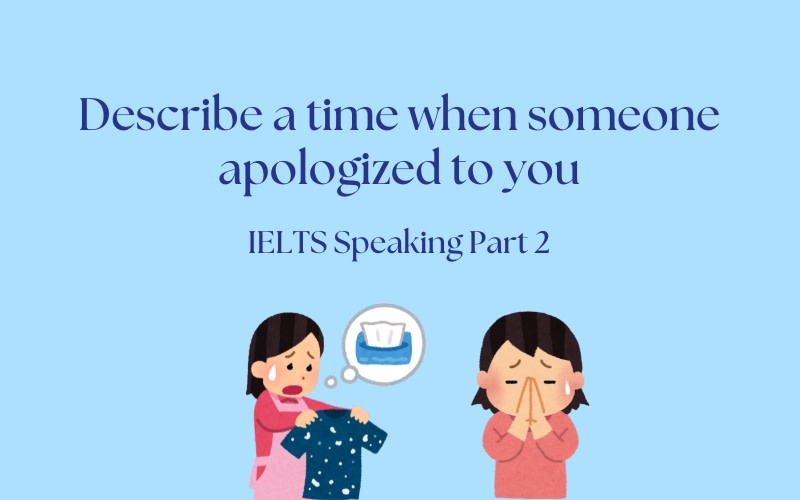Describe a time when someone apologized to you is a topic in the group of describing experiences - a group of topics that often appear in the IELTS Speaking Part 2 test. In this part, the examiner will evaluate your ability to tell a story fluently and smoothly. So how can your speech impress the examiner? In this article, IDP IELTS will suggest you some arguments, sample essays and useful vocabulary on this topic.
1. Understanding the Topic – IELTS Speaking Part 2
The topic Describe a time when someone apologized to you belongs to the category of experience-based topics, which often appear in IELTS Speaking Part 2. You will have one minute to prepare and up to two minutes to speak, following the cue card provided.
Describe a time when someone apologized to you
You should say:
When it happened
Who this person is
Why he/ she apologized to you
How you felt
2. Suggested Outline for IELTS Speaking Part 2
Outlining is an important step to help your speech flow more smoothly and coherently. Once you have identified your main points, it will be easier for you to organize and structure your ideas. Below is an outline and sample points for the topic “Describe a time when someone apologized to you - IELTS Speaking Part 2:
When it happened
Just last week, my friend borrowed a pair of sneakers for the day.
Who this person is
Rose is my close friend.
Why he/ she apologized to you
She had spilled red wine on one of my shoes and she could not clean the stain. She sincerely apologized for her carelessness and acknowledged that she had neglected to take care of the shoes.
How you felt
Deep down, I knew that she was truly sorry for the incident. In any other situation, I would have lost my temper. However, I could not stay angry for long because of her sincere apology.

3. Sample Answer – IELTS Speaking Part 2
Describe a time when someone apologized to you
Just last week, my friend borrowed a pair of sneakers for the day. Rose is my close friend, so she knows how much I care about my shoe collection. I was worried, so I asked her to take good care of them.
"I'll see to it," she said. However, when she called me the next day, her voice sounded weak. After I asked her a few times, she admitted that she had accidentally spilt red wine on one of my shoes and couldn’t clean the stain. She sincerely apologized for her carelessness and acknowledged that she had neglected to take care of the shoes. She promised to get me another pair of shoes from the same brand.
Although I knew she didn’t mean it, I was still upset that one of my favorite shoes had been ruined. Deep down, I knew that she was truly sorry for the incident. In any other situation, I would have lost my temper. However, I could not stay angry for long because of her sincere apology.
The next day, she took me to the shoe store and bought me a new pair. She apologized again and promised to be more cautious going forward.
Band-boosting vocabulary:
Footwear collection
Handle with care
Subdued voice
Confess
Oversight
Irreparably ruined
Sincere apology
Lost my temper
Make amends
Be more vigilant
4. Sample Answers – IELTS Speaking Part 3
Q: On what occasions do people usually apologize?
People usually apologize when they make a mistake. For instance, being late for an appointment or accidentally damaging someone’s belongings. These apologies reflect accountability and a willingness to correct the situation, which helps maintain relationships.
Q: Do people often say sorry in your country?
Sadly, not always. Many people feel embarrassed to apologize because they fear admitting mistakes makes them appear weak. This mindset should change, as showing regret can strengthen relationships and emotional maturity. Parents should lead by example to teach this to children.
Q: Should people apologize for any mistake they make?
Yes, people should take responsibility for their actions. A genuine apology can ease tension and promote reconciliation, even when the mistake cannot be undone. For example, if someone unintentionally damages a valuable item, they should express regret and offer compensation.
Advanced vocabulary:
Inadvertently
Self-awareness
Readiness to rectify
Personal accountability
Humiliated
Concede shortcomings
Manifestation of vulnerability
Reinforce interpersonal bonds
Defuse tensions
Irreplaceable belonging
5. Useful Vocabulary for the Topic
Common Vocabulary
Apologize (v): to say sorry
Sincere (adj): genuine
Regret (n/v): feeling sorry for something
Forgive (v): to stop being angry
Misunderstanding (n): a failure to understand
Acknowledge (v): to admit
Make amends (phrase): to compensate
Reconciliation (n): making peace
Idioms and Phrases
Own up to a mistake: admit the mistake
Swallow one’s pride: accept being wrong
Let bygones be bygones: forgive and forget
Mend fences: repair a relationship
Clear the air: resolve misunderstanding
Turn over a new leaf: start fresh
Hold a grudge: stay angry
Patch things up: make peace
Ace IELTS Speaking with IDP
We hope this guide on Describe a time when someone apologized to you helps you organize your ideas and perform better in your IELTS Speaking test. For more effective preparation, explore the official IELTS preparation resources from IDP.
When registering for IELTS at IDP, you can choose between IELTS Academic and IELTS General Training, and sit the test on computer with flexible test dates. With the One Skill Retake option, you can even retake just one skill to improve your overall band score.
Register for your IELTS test with IDP today and take a confident step toward your goals.
